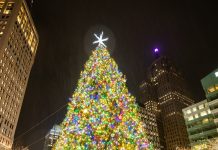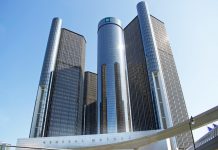On June 23, 1963, 20 years after the deadly race riot that began on Belle Isle, an estimated 125,000 peaceful civil rights demonstrators participated in the led by the Rev. Martin Luther King Jr. and other community leaders.
The group marched for nearly a mile down Woodward Avenue to Cobo Arena, where King delivered refrains similar to the âI have a dreamâ portion of his famous speech given two months later at the March on Washington.
The Walk to Freedom was organized principally by the Rev. C.L. Franklin â the father of singer Aretha Franklin â and the Rev. Albert Cleage Jr., who, with other planners, formed the Detroit Council for Human Rights (or DCHR),Ìıwhich mobilized participants for the event.
The purpose was to speak out against segregation, raise awarenessÌıof employment and housing discrimination, and obtain financial support for King and the Southern Christian Leadership Conference.
With the sun shining on a beautiful June day,Ìıat 3 p.m., the predominantly Black crowd became nearly a mile deep and began the Walk to Freedom at Adelaide Street and Woodward Avenue near present-day Little Caesars Arena.
Those leading the parade, with arms often locked together, included King, Franklin, Cleage, United Auto Workers President Walter Reuther, Detroit Mayor Jerome Cavanagh, Black activist JamesÌıDel Rio, prominent mortician and DCHR co-Chair Benjamin McFall, U.S. Rep. Charles C. Diggs Jr., and former Michigan Gov. John Swainson.
Accompanied by over 500 police officers,Ìıthe massive crowd, which included members of churches, labor unions, civic groups, and schools, carried various civil rights signs while breaking out in songs, among them âWe Shall Overcomeâ and âThe Battle Hymn of the Republic.â
Elliott Hall, who had just finished his second year at Wayne State University Law School, marched with his wife while carrying signs as part of the organization Congress of Racial Equality.
âIt was a peaceful, energetic march and justÌıa mass of people,â says the pioneering Hall, who later became president of the , the first Black corporation counsel for Detroit, the first Black chief assistant prosecutor for Wayne County, and the first Black vice president at Ford Motor Co.
A crowd of 25,000 packedÌıthe then-3-year-old Cobo Hall to capacity. âBecause we were so far behind, starting out on Woodward just south of Warren, we had no shot of getting inside Cobo Hall,â Hall says. âHowever, we were able to hear Dr. Kingâs speech through loudspeakers set up outside.â
He says that most of the marchers, as far as he could see, stayed outsideÌılistening to the program, which was emceed byÌıthe Rev. Franklin and included prayer, music, and speeches from various civic leaders, beginning with Cavanagh, who provided the cityâs formal welcome.
The crowd inside and outside applauded the dynamic 34-year-old civil rights leader as he stepped up to the microphone to deliver a stirring 30-minute speech.
âI cannot begin to tell you the deep joy that comes to my heart as I participate with you in what I consider the largest and greatest demonstration for freedom ever held in the United States,â King said. âAnd I can assure you that what has been done here today will serve as a source of inspiration for all of the freedom-loving people of this nation.â
Near the end, the great orator began to recite 10 âI have a dreamâ verses before concluding: âWith this faith, we will be able to achieve this new day when all of Godâs children, Black men and white men, Jews and gentiles, Protestants and Catholics, will be able to join hands and sing with the Negroes in the spiritual of old: âFree at last! Free at last! Thank God almighty, we are free at last!ââ
The crowd then rose as one in thunderous applause.
âWe left in high spirits after hearing Dr. King,â Hall says. âThe experience gave us tremendous hope for the future because of the march, our activism, and the work of Dr. King.â
Motown Records founder Berry Gordy recorded the speech and produced an album on the Tamla Motown label titled The Great March to Freedom: Rev. Martin Luther King Speaks. It was released in August 1963. Motown later quickly produced an album called The Great March on Washington featuring the speeches from that day.
A portion of the royalties from the albums supported the Southern Christian Leadership Conference at Kingâs direction.
Four days after the Detroit march, Cavanagh spoke at the National Newspaper Publishers Association convention in Detroit and praised the Walk to Freedom: âJust last Sunday, Detroit allowed the nation and the world to see that men of goodwill, no matter what their color, can band together peacefully to protest the stifling evil of prejudice.â
This story is from the June 2023Ìıissue of ÌÇĞÄvlog°²×¿°æ. Read more in our digital edition.
|
| Ìı |
|








